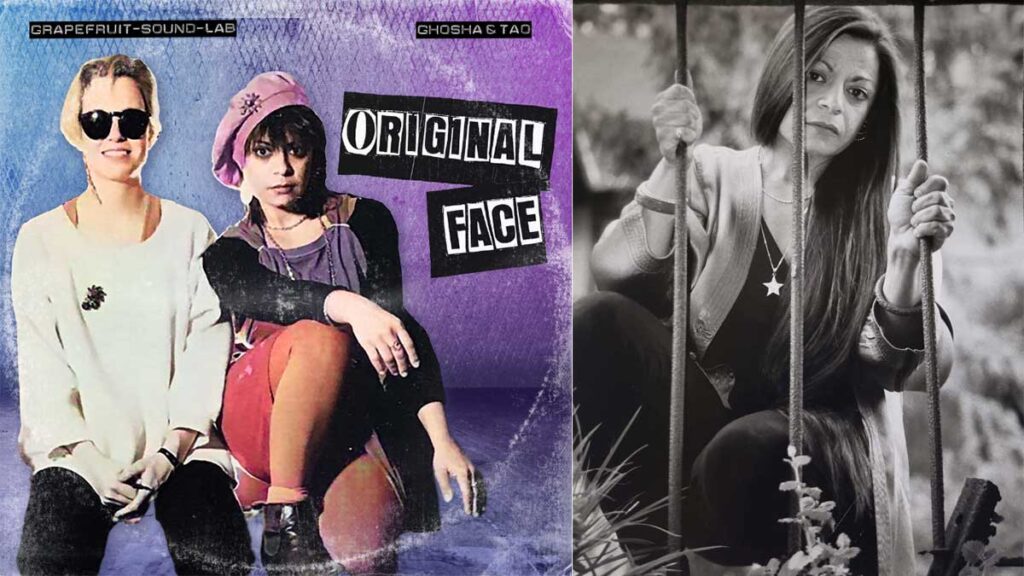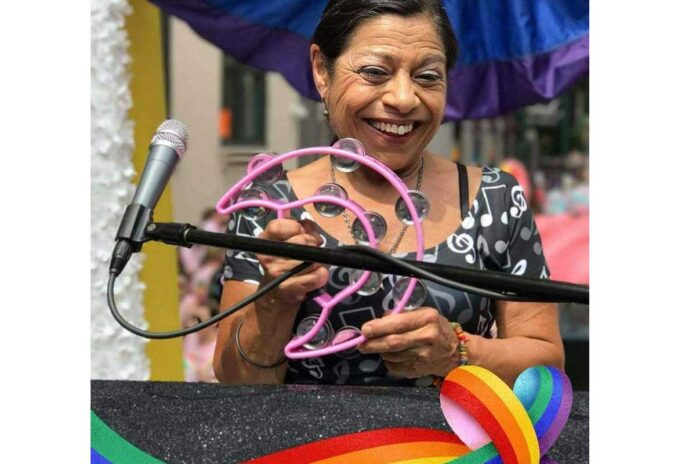It’s been four years since Philly lost beloved musician Patty D’Aguanno, also known as Ghosha, who played piano at Tavern on Camac for 15 years. To celebrate her musical legacy and her life, Ghosha’s brother Frank D’Aguanno will host a record release party at Tavern on Saturday, April 23 at 7:30 p.m. Frank teamed up with Robert Cotnoir of Grapefruit Sound Lab to reproduce five songs written and recorded by his sister and her musical collaborator and girlfriend at the time, Lesley Tao Mowatt, who went by Tao. The album of reworked, modernized tracks is called “Original Face.”
“Rob was great at helping keep the integrity of the actual original songs,” Frank said. “And keeping Tao’s guitar solos and her guitar work still intact, and some of my sister’s original keys. But the most important thing was keeping my sister’s vocals and songwriting prominent, and that is the gold of this project.”
Tom Yaz, VJ at Wave Video Bar in Provincetown, Mass., created a half hour dance mix of the songs on “Original Face,” which will be played at the release party. The project has been generating buzz, including support from Fred Schneider of the B-52’s as well as WXPN’s Robert Drake, a long-time fan of Ghosha’s music.

Frank described “Original Face” as an experiment in different musical genres, including industrial rock, Middle Eastern musical influences and one song that’s reminiscent of the Pointer Sisters. Ghosha and Tao first recorded the songs between 1985 and 1991.
The song “Rainbow” originally sounded like “Love Shack” by the B-52’s, Frank said. When he was working with Cotnoir to infuse a new mix into the song, which they initially wanted to be an upbeat gay anthem, the news was bombarded by the humantarian crisis that resulted from the U.S. vacating troops from Afghanistan.
“Then all of a sudden we were like, the entire world is in a refugee crisis,” Frank said. “Ukraine was already an issue then. All of a sudden, Rob was like, this [song] isn’t just about the gay people, this is about the rainbow of the world that we’re forgetting about. It’s all these people that are important.” Cotnoir completely changed the vibe of the song. “That I think is one of the shining moments on that album,” Frank said.
Ghosha began her musical career in the 1970s when she wrote and performed folk music in Philadelphia, and also wrote jingles for commercials ranging from Dietz & Watson to Valley Forge Music Fair. Musically, she was versatile from the get-go. While she wrote and recorded her first full-length album at Mike Nise’s studio, she teamed up with her friend Karen to write a “cheesy, raunchy and quite hysterical” stage show called “Processed American Cheese.”
Ghosha met Tao in the 1980s and continued exploring different musical genres, including New Wave. At one point, the two musicians moved to the west coast to experience spirituality and community in the Rashneesh commune, which also fueled their songwriting, Frank said. Ghosha and Tao later moved back to Philadelphia where they continued writing music together and formed the band The Square Roots.
As part of her performance career in Philly, Ghosha played during former Governor Ed Rendell’s Get Out The Vote bar crawls in the gayborhood, at the 2017 Philly Pride parade, and of course regularly at Tavern on Camac, SawTown Tavern, and other venues.
Frank said that he’s looking forward to sharing his sister’s musical history with the community.
“She’s full of surprises that I can’t wait to uncover for a lot of people, and I hope they’re prepared for them. She’s an onion with many, many layers.”
Empress Mars of the band Settled Arrows was a musical colleague of Ghosha’s at Tavern on Camac. Mars was heavily influenced by her music and considers her “one of the most important musical mentors of my life,” they said in an email. “Sitting at her piano was a safe port in the storm. She was open hearted, real and such a soulful artist. Ghosha never missed a beat and she always brought an open heart to every song. I cherish the times she would sing her original music, especially the song ‘Modern Age,’ which moved me to tears on more than one occasion. She gave the world lifetimes of music and I miss her terribly.”
Ghosha also left an imprint on Joe Black, who worked as manager of Tavern on Camac for many years. One of Black’s responsibilities was booking the piano schedule at Tavern. “I always knew I’d never get showtunes out of Ghosha, but I’d always get blues and soul and great ‘70s and some original stuff. She’s probably one of the most dedicated players we’ve ever had.”
Black fondly remembered how Ghosha made everyone feel welcome at Tavern. When she performed and occasionally had patrons come up and sing, “she never made anybody feel bad if they weren’t great,” Black said. “She tried to make people better as they sang, and I know she gave a lot of advice to people who thought they were good but needed a push. It’s one thing when you have a diva piano player versus somebody who really took the time to make each and every singer feel valid.”
One of Frank’s fondest memories of his sister as a musician, he said, has to do with her song “Let it Be Love,” which was one of her standards at Tavern. The heartfelt piano ballad is all about being given a second chance. When Frank initially heard the song in the 2000’s, he found it to be overly cheesy.
“After she passed away I was listening to it again, and I was like, ‘oh my god, this song is so amazing; it’s poignant,” he said. “She sang so much about herself and I don’t know if I ever really listened. I really wished I would have listened to the song and then I would have had a little more insight on her.”
As for memories that stick with him from his life with his sister, having lived with her for 20 years in adulthood, Frank pointed out that it’s the little things that stand out the most.
“One of the things that I took for granted was simply calling from one room to the other to ask if the coffee was done yet,” Frank said. He moved out of his family house and now lives on the West Coast, but every so often he still shouts out, “‘hey, is the coffee done yet?’ Because it was always the fabulous responses I would get back, and I can’t say them because they’re full of profanities. For anyone out there who loses someone special I think that’s all that it really boils down to. It’s going to be a simple memory.”
